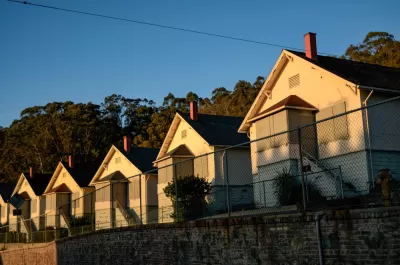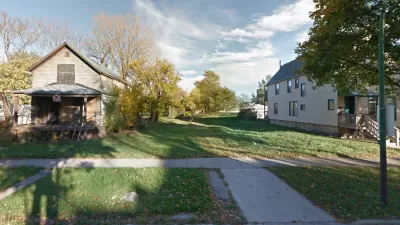A proposed tax credit designed to stabilize single-family neighborhoods facing growing numbers of vacancies is making its way through Congress.

Kristin Siglin reports "recent actions in both the House and the Senate that show some real momentum behind the Neighborhood Homes Investment Act (NHIA)," in an article for Shelterforce magazine.
As discussed in Planetizen coverage from July 2020, the NHIA would create a tax credit "to spur investment in modest single-family homes in distressed neighborhoods," as explained by Siglin here.
According to Siglin, the bipartisan coalition behind the bill is motivated by a "lack of suitable housing supply and the problem of neighborhoods plagued by substandard housing and vacancy."
"In many communities across the country, the cost of renovating or building homes exceeds the price the homes can be sold for. This discourages mortgage lending in these communities, which limits the availability of homes that are affordable to first-time homebuyers."
The NHIA addresses that gap by creating a tax credit, allocated by states, that make up the difference between the cost of construction and the sales price of a home "if the home is sold to an owner-occupant who earns under 140 percent of the Area Median Income," according to Siglin. "It is modeled on the Low Income Housing Tax Credit (LIHTC), which is also allocated by the states and has a 30-year track record of spurring the construction of affordable apartments."
More details on the NHIA and the housing market realities that the legislation responds to are included in the source article.
FULL STORY: Is a Subsidy for Single-Family Homes in Distressed Areas Closer to Becoming Reality?

Study: Maui’s Plan to Convert Vacation Rentals to Long-Term Housing Could Cause Nearly $1 Billion Economic Loss
The plan would reduce visitor accommodation by 25,% resulting in 1,900 jobs lost.

North Texas Transit Leaders Tout Benefits of TOD for Growing Region
At a summit focused on transit-oriented development, policymakers discussed how North Texas’ expanded light rail system can serve as a tool for economic growth.

Why Should We Subsidize Public Transportation?
Many public transit agencies face financial stress due to rising costs, declining fare revenue, and declining subsidies. Transit advocates must provide a strong business case for increasing public transit funding.

Alabama: Trump Terminates Settlements for Black Communities Harmed By Raw Sewage
Trump deemed the landmark civil rights agreement “illegal DEI and environmental justice policy.”

Dear Tesla Driver: “It’s not You, It’s Him.”
Amidst a booming bumper sticker industry, one writer offers solace to those asking, “Does this car make me look fascist?”

A Visual Celebration of Manhattan’s Chinatown Elder Community, Through Food
Lanterns, cafeteria trays, and community connection take center stage in this stunning photo essay.
Urban Design for Planners 1: Software Tools
This six-course series explores essential urban design concepts using open source software and equips planners with the tools they need to participate fully in the urban design process.
Planning for Universal Design
Learn the tools for implementing Universal Design in planning regulations.
City of Santa Clarita
Ascent Environmental
Institute for Housing and Urban Development Studies (IHS)
City of Grandview
Harvard GSD Executive Education
Toledo-Lucas County Plan Commissions
Salt Lake City
NYU Wagner Graduate School of Public Service




























